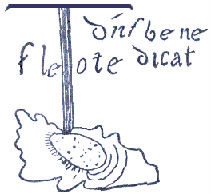 Peace!
Peace!This is an ancient feast in the Church. (Note that the celebration of John's birth, sixth months before Jesus', falls on June 24, because in the old way of reckoning, each feast is six days before the beginning of the next month.)
This day is important for all the Church in remembering John, and more importantly, God's work through John. The readings all speak of God knowing and acting from his birth, and even from before his birth, when he was in the womb. Actually, from the moment of his conception. God works in all of us from that moment, for life is a continual gift.
It is interesting that in the debate over the use of embrionic stem cells, the Church's opposition is considered part of being 'anti-science.' But it's just the opposite: the oppostion comes because of what science tells us: that even the single cell produced by the union of a sperm and an egg contains all the DNA information for a complete and unique individual person! In earlier times they did not know that, and discussed when an embryo or a fetus was 'quickened,' i.e., when it received its soul. Yet now, we know that the 'human-ness' of each person goes all the way back to conception. Science tells us that, yet some choose to ignore it.
The feast of the Birth of John the Baptist is also significant for Franciscans, because that is Francis's baptismal name: Giovanni Battista. His father later made everyone call him Francesco, "Frenchy." This was probably because a cloth merchant didn't think it appropriate for his son to be named after a man who wore camel's hair! Francis didn't seem to live up to his patron saint at first, but his life showed that he was more like the Baptist than anyone would have guessed.
May John the Baptist help us to witness to Christ, to follow him, and to live our vocation to love as God loves, a vocation given to every one of us from the moment of our conception.
God bless!

No comments:
Post a Comment